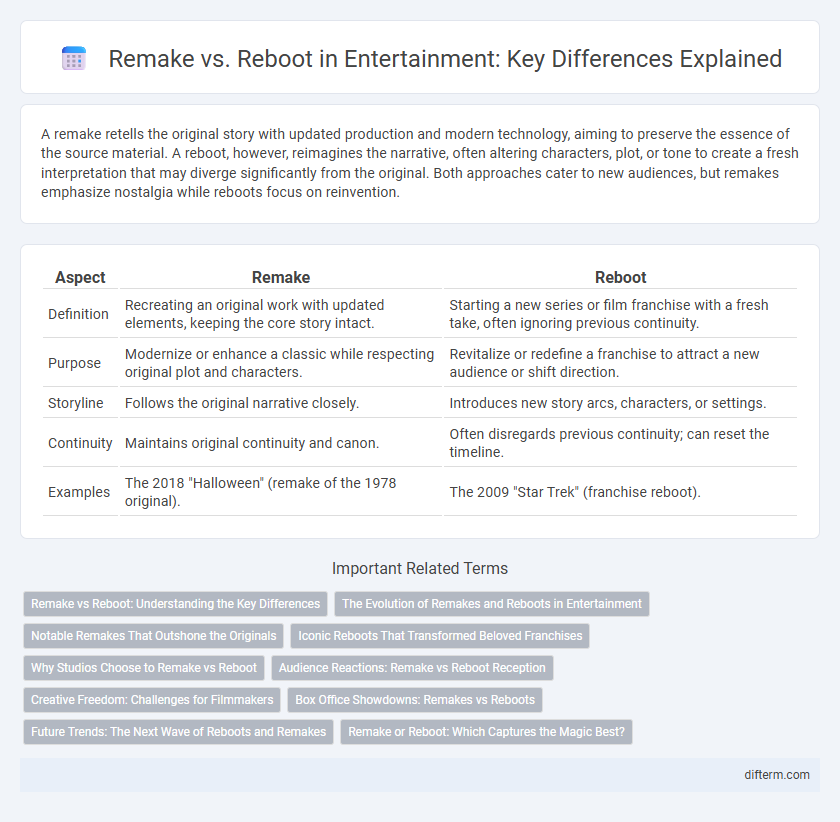A remake retells the original story with updated production and modern technology, aiming to preserve the essence of the source material. A reboot, however, reimagines the narrative, often altering characters, plot, or tone to create a fresh interpretation that may diverge significantly from the original. Both approaches cater to new audiences, but remakes emphasize nostalgia while reboots focus on reinvention.
Table of Comparison
| Aspect | Remake | Reboot |
|---|---|---|
| Definition | Recreating an original work with updated elements, keeping the core story intact. | Starting a new series or film franchise with a fresh take, often ignoring previous continuity. |
| Purpose | Modernize or enhance a classic while respecting original plot and characters. | Revitalize or redefine a franchise to attract a new audience or shift direction. |
| Storyline | Follows the original narrative closely. | Introduces new story arcs, characters, or settings. |
| Continuity | Maintains original continuity and canon. | Often disregards previous continuity; can reset the timeline. |
| Examples | The 2018 "Halloween" (remake of the 1978 original). | The 2009 "Star Trek" (franchise reboot). |
Remake vs Reboot: Understanding the Key Differences
Remake and reboot both involve revisiting existing entertainment properties, but a remake typically retells the original story with updated elements while maintaining core plot and characters. A reboot, however, resets the narrative universe entirely, often altering characters, settings, and storylines to create a fresh start. Understanding these distinctions helps audiences set expectations for familiarity versus innovation in film and television adaptations.
The Evolution of Remakes and Reboots in Entertainment
The evolution of remakes and reboots in entertainment highlights a dynamic shift from simply replicating original content to reimagining stories for new audiences with fresh perspectives and modern technology. Remakes often preserve core plot elements while updating visuals and settings, whereas reboots tend to overhaul characters and narratives to revitalize entire franchises. This transformation reflects changing viewer expectations and advances in production techniques, driving the ongoing popularity of both formats in film, television, and video games.
Notable Remakes That Outshone the Originals
Notable remakes like "The Departed" (2006) and "A Star Is Born" (2018) have outshone their originals by updating storylines and enhancing cinematic techniques to resonate with contemporary audiences. These remakes often boost box office revenue and critical acclaim by leveraging modern technology and fresh performances. Successful remakes balance honoring the source material with innovative storytelling to create enduring cultural impacts.
Iconic Reboots That Transformed Beloved Franchises
Iconic reboots such as the 2009 "Star Trek" revitalized the beloved sci-fi franchise by introducing a fresh cast and modern storytelling while honoring the original's legacy. The 2018 "Halloween" reboot reimagined the classic slasher film by directly continuing the 1978 story, discarding multiple sequels to deliver a streamlined, suspenseful horror experience. These transformative reboots demonstrate how revitalizing franchises with innovative narratives and updated production can rejuvenate fan engagement and attract new audiences.
Why Studios Choose to Remake vs Reboot
Studios choose to remake films to capitalize on the nostalgic appeal of original stories, often targeting existing fans with a familiar plot enhanced by modern technology and updated cultural sensibilities. Reboots are preferred when studios aim to refresh a franchise's narrative and character arcs, attracting new audiences and providing creative freedom to redefine the brand. Both strategies involve leveraging established intellectual property, but remakes prioritize preservation and modernization, while reboots emphasize reinvention and long-term franchise potential.
Audience Reactions: Remake vs Reboot Reception
Audience reactions to remakes often focus on nostalgia and faithful recreation of the original, with fans appreciating familiar characters and storylines updated with modern technology. Reboots tend to generate mixed responses, as they may introduce significant changes or new interpretations that challenge fans' expectations. Box office performance and social media sentiment frequently reflect these divided opinions, highlighting the balance between innovation and respect for source material in entertainment.
Creative Freedom: Challenges for Filmmakers
Remakes often restrict creative freedom since filmmakers must adhere closely to the original's storyline and characters, limiting innovation and fresh interpretations. Reboots provide greater latitude to redefine narratives, update themes, and experiment with character development, appealing to contemporary audiences. However, both approaches face the challenge of balancing original fan expectations with creative risks to craft engaging and relevant entertainment.
Box Office Showdowns: Remakes vs Reboots
Remakes and reboots each offer unique opportunities to capture box office audiences, with remakes often relying on nostalgic appeal by retelling classic stories, while reboots refresh franchises for contemporary viewers through new narratives or tonal shifts. Recent box office showdowns reveal that successful reboots like "Spider-Man: Into the Spider-Verse" can outperform remakes by innovating within established universes, highlighting audience preference for originality blended with familiarity. Data from global markets shows that reboots tend to generate higher total revenue and longer franchise lifespan, leveraging modern technology and expanded lore to captivate diverse demographics.
Future Trends: The Next Wave of Reboots and Remakes
Future trends in entertainment indicate a surge in reboots and remakes driven by advanced AI, virtual reality, and interactive storytelling technologies. Studios increasingly leverage data analytics to identify nostalgia-rich properties, optimizing audience engagement and profitability. The next wave emphasizes hybrid formats that blend classic narratives with immersive experiences, reshaping how audiences connect with familiar franchises.
Remake or Reboot: Which Captures the Magic Best?
Remakes often preserve the core storyline and characters, appealing to nostalgic audiences by enhancing original elements with modern technology and storytelling techniques. Reboots, on the other hand, reinvent the narrative and characters, offering a fresh perspective that revitalizes a franchise for new generations. Choosing between a remake or reboot hinges on whether the goal is to honor the original's legacy or to innovate and expand the universe creatively.
remake vs reboot Infographic

 difterm.com
difterm.com